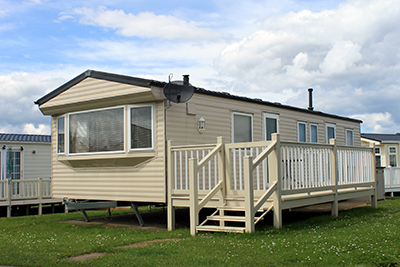|
Summer 2016
IN THIS ISSUE
d&G Lawyer News
Educational Workshops
Interested in a seminar on a recurring legal issue confronting your company?
Contact our event coordinator,
to learn more about our educational workshop options.
Visit Our Site:

101 E. Kennedy Blvd.,
Suite 2000
Tampa, FL 33602
813-229-2775
|

The National Manufactured Home Construction and Safety Standards Act:
Don’t Get Left High and Dry in a Leaking Home
By: Don Greiwe
Manufactured homes, more commonly called mobile homes, differ from traditional homes in that they are generally constructed in factories and then transported to their sites of use. In Florida, the manufactured home industry is big business; according to the United States Census Bureau, as of 2014, there were over 828,000 manufactured homes in Florida, constituting over 9% of all residences in the state, and constituting almost 10% of all manufactured homes in the United States. i Considering the prevalence of manufactured homes in our state, it is important for residents to be aware of the regulations and requirements to which manufactured home manufacturers must adhere.
Like traditional homes built on-site, manufactured homes must be built according to strict minimum standards in order to ensure their habitability and durability; homes that fail to meet these standards can often leave a homeowner with significant water and moisture damage inside the home. Unlike traditional homes, manufactured homes are not governed by the Florida Building Code. Rather, they are governed by federal regulations, promulgated under the National Manufactured Housing Construction and Safety Standards Act, 42 U.S.C §§ 5401 et seq. (the “NMHCSSA’). Codified in 24 C.F.R. Part 3280, the NMHCSSA sets forth standards for “all equipment and installations in the design, construction, transportation, fire safety, plumbing, heat-producing and electrical systems of manufactured homes which are designed to be used as dwelling units.” ii
The NMHCSSA largely leaves enforcement of the NMHCSSA to the manufacturers themselves. iii A manufacturer is required to notify a purchaser of a defect “which he determines, in good faith, relates to a Federal manufactured home construction or safety standard or . . . constitutes an imminent safety hazard to the purchaser of the manufactured home, within a reasonable time after such manufacturer has discovered such defect.” Furthermore, in the event that the United States Department of Housing and Urban Development (“HUD”) discovers that a manufactured home “(1) does not comply with an applicable Federal manufactured home construction and safety standard . . . or (2) contains a defect which constitutes an imminent safety hazard,” HUD must notify the manufacturer of such a defect. v At that point, the manufacturer is given the opportunity to establish that there has been no failure to comply with the safety standards; if it cannot, it must provide notice to the homeowner of the defect.
Notice, however, does not necessarily mean repair. Under the NMHCSSA, manufacturers are only responsible for repairing defects that (1) present “an unreasonable risk of injury or death to occupants” of the home, or (2) can be related to an error in design or assembly by the manufactured home by the manufacturer.” vi Importantly, this determination is made by HUD after “an opportunity for oral and written presentation of views by interested persons.” vii
Significantly, there is no private cause of action for the purchaser of a manufactured home under the NMHCSSA. viii How then, are the NMHCSSA’s standards enforced by homeowners? Must consumers merely be content to rely on the federal government, or a distributor or retailer in the chain of sale to sue a manufactured home manufacturer who produces substandard homes for its customers and refuses to repair defects that violate the Federal standards? The answer thankfully, is no.
This lack of a private cause of action under the NMHCSSA does not permit manufactured home manufacturers to construct and sell substandard homes without consequence. The Federal statute provides that “nothing in this section shall limit the rights of the purchaser or any other person under any contract or applicable law.” ix Furthermore, the statute makes it clear that compliance with the federal standards does not exempt a manufacturer from liability under common law. x Thus, a manufactured home manufacturer is subject to commercial and consumer protection laws as well as claims under the common law. Violations of the NMHCSSA’s standards may be introduced as evidence in such cases.
If you own a manufactured home and believe the home was not constructed in conformance with the National Manufactured Housing Construction and Safety Standards, consider taking the following steps in order to maximize your chance at obtaining relief:
- To the best of your ability, identify the cause and effect of the defect as soon as possible.
- Document the defect with pictures and a written description.
- Promptly notify both the manufacturer of the manufactured home and HUD. xi
- In the event that the defect persists and no relief is obtained, consider contacting an attorney.
- Act promptly. Actions brought under consumer protection laws and common law are
subject to various statutes of limitation, the expiration of which can preclude recovery.
If you have further questions regarding manufactured housing, your rights as a manufactured home owner, or the National Manufactured Housing Construction and Safety Standards Act, please contact David Caldevilla or Don Greiwe in our office at dcaldevilla@dgfirm.com or dgreiwe@dgfirm.com.
_________________________________
i U.S. Census Bureau; American Community Survey; 2010-2014 American Community Survey 5-year estimates; generated by Don Greiwe; using American FactFinder; ; (05 May 2016).
ii 24 C.F.R. § 3280.1.
iii See 42 U.S.C. § 5414.
iv 42 U.S.C. § 5414(a).
v 42 U.S.C. § 5414(e).
vi 42 U.S.C. § 5414(g).
vii Id.
viii See 42 U.S.C. §§ 5411(a) and 5412(b) (providing that injunctive relief is only available against a manufacturer to the federal government or distributors and dealers).
ix 42 U.S.C. § 5414(g).
x 42 U.S.C. § 5409(c).
xi Find a local office of the U.S. Department of Housing and Urban Development at http://portal.hud.gov/hudportal/HUD?src=/program_offices/field_policy_mgt/localoffices
|



